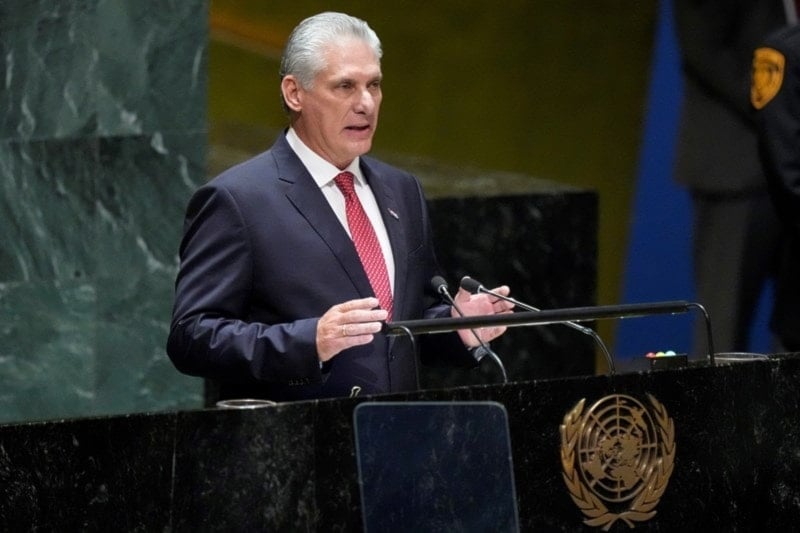Cuban president: 'Havana syndrome' study suspension proof of falsehood
Cuban President Miguel Díaz-Canel Bermúdez has emphasized that the "Havana Syndrome" is increasingly being discredited by recent studies.
-

Cuban President Miguel Diaz-Canel addresses the 78th session of the United Nations General Assembly, Tuesday, September 19, 2023, at the United Nations headquarters. (AP)
The "false" Havana Syndrome is increasingly being discredited by recent studies, Cuban President Miguel Diaz-Canel Bermudez emphasized.
Retweeting CNN's news report that the NIH canceled the Havana syndrome research, citing unethical coercion of participants, the Cuban president reminded the world how "the media seem to overlook the fact that the so-called Havana Syndrome was used as a vile pretext to label Cuba as a state sponsor of terrorism and reinforce #BloqueoGenocida with more than 240 measures."
He maintained that this constitutes "a policy initiated by Trump and continued under Biden."
Ya no soporta estudios el falso síndrome de #LaHabana. Pero los medios olvidan mencionar que fue vil pretexto para incluir a #Cuba en la lista de patrocinadores del terrorismo y reforzar el #BloqueoGenocida con más de 240 medidas. Obra de Trump que mantiene Biden. pic.twitter.com/FfCvHA6ksT
— Miguel Díaz-Canel Bermúdez (@DiazCanelB) September 1, 2024
This comes as CNN reported on Friday that the National Institutes of Health is halting research into the "Havana Syndrome", a term used to reflect a mysterious illness affecting spies, soldiers, and diplomats who have reported sudden, severe symptoms of unknown cause.
The NIH announced it would discontinue the research "out of an abundance of caution" after an internal investigation revealed that participants had been coerced into joining the study. While the agency clarified that it was not responsible for the coercion, it did not specify who was. The NIH emphasized that voluntary consent is a fundamental principle of ethical research.
Some individuals who reported being ill previously alleged that the CIA required them to participate in the research as a condition for receiving healthcare.
A CIA official stated that the agency takes “any claim of coercion, or perceived coercion, extremely seriously and fully cooperated with NIH’s review of this matter, and have offered access to any information requested.” The official also claimed that the CIA fully cooperated with the NIH's review and provided access to any requested information.
The CIA inspector general is also aware of the NIH's findings and the related prior allegations, the official said as quoted by CNN.
Dive deeper
In May, a former CIA officer who says he has been sick told CNN, “They wanted us to be a lab rat for a week before we actually got treatment at Walter Reed — and at a bare minimum, that is unethical and immoral.”
Polymeropoulos, who advocates for those affected by what the US government refers to as “anomalous health incidents,” stated that he believes senior CIA leadership mandated participation in the research.
In March, the CIA issued a statement denying that participation was required, but the agency did not respond to CNN’s request for comment on Friday.
Ethicists note that forced participation in studies is both highly unethical and extremely rare.
On Friday, the NIH informed JAMA, the medical journal that published two studies from the research in March, about the update.
The NIH stated that halting the research does not alter the conclusions drawn. Despite reports from federal employees about symptoms, neither study identified any definitive causes for the health issues.
It is worth noting that symptoms of the ailment have reportedly included migraines, nausea, memory lapses, and dizziness. It was first reported in the US embassy in Cuba, Havana, in 2016.
This comes although earlier, in January 2022, the Central Intelligence Agency (CIA) concluded that US diplomats who have been suffering mysterious headaches and nausea in a phenomenon that's been called "Havana Syndrome" were not targets of a global campaign by a foreign power.
The CIA said at the time it had found plausible explanations in hundreds of cases.
Read next: Claims of Russia's involvement in Havana Syndrome 'baseless': Kremlin

 4 Min Read
4 Min Read








